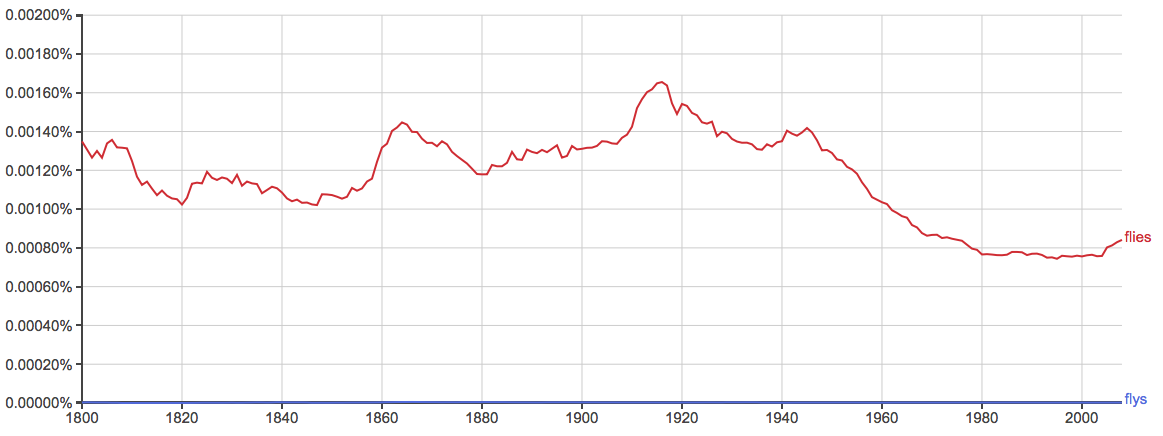Many verbs have unique conjugations. It can be difficult to remember the rules that govern their use, but it’s not impossible. Today’s topic, the verb fly, follows the general rules governing words that end in -y.
But one historical use of the word throws a monkey wrench into our simple standards. Even though flies is the modern use of this word as a verb and a plural noun, there was a point in time when flys was also a correct spelling.
What is the Difference Between Flys and Flies?
In this post, I will compare flys vs. flies. I will use each of these words in at least one example sentence, so you can see them in context.
Plus, I will show you a useful mnemonic that will help you decide whether to use flys or flies in your own writing.
When to Use Flies
 What does flies mean? Flies can be a noun or a verb. As a noun, it is the plural of fly, which is a type of small winged insect.
What does flies mean? Flies can be a noun or a verb. As a noun, it is the plural of fly, which is a type of small winged insect.
Flies are often attracted to putrid scents, and can be found in garbage piles, barnyards, and on roadkill. Some flies survive by drinking the blood of living creatures and will sometimes bite humans. These flies are often found in forests and near bodies of water.
Check out these examples,
- When we returned to the battleground the next day, the air was thick with flies feeding on the corpses of fallen soldiers.
- I went tubing on the river, but I was bitten by flies.
As a verb, flies is a conjugation of the verb to fly, which means to move through the air. Flies is the third person singular present tense conjugation of this verb.
Here are three examples,
- Jan usually flies with United Airlines, but probably not anymore.
- Each morning, the bird flies to the edge of the meadow to sing.
- For example, I didn’t get a chance to tell you that when Terry Hughes — the reef scientist at the heart of our story — flies over the Great Barrier Reef to conduct surveys, there is a lifeboat between the seats of the small charter plane he uses because they are flying so low and slow that the chance of crashing is severe. –The New York Times
Phrases That Use Fly
 There are many phrases in English that utilize the verb fly in its various forms. Here are a few of the more popular ones.
There are many phrases in English that utilize the verb fly in its various forms. Here are a few of the more popular ones.
- How time flies! : A period of time has passed without someone knowing; time is moving quickly.
- Fly the coop: to make an escape.
- Fly high: to be very succesful.
- Fly in the face of: to be openly at variance with what is usually expected.
When to Use Flys
What does flys mean? Flys is a misspelling of the verb flies. It is not used in modern English.
As you can see from the below graph, which charts flys vs. flies over time, flys doesn’t even register a blip over the last 200 years of written English.

Intriguingly, in 19th-century England, a fly was also a type of vehicle with four wheels that was operated by the strength of humans’ legs. The plural version of this noun was flys.
While you would be unlikely to use the word this way today, here is an example anyway,
- Charles and Xavier took flys to the theatre.
Trick to Remember the Difference
 In general, flies is the only correct version of this word today. If you were writing unusually detailed period fiction about 19th-century Great Britain, you could use flys as a plural noun to refer to a specific mode of transportation.
In general, flies is the only correct version of this word today. If you were writing unusually detailed period fiction about 19th-century Great Britain, you could use flys as a plural noun to refer to a specific mode of transportation.
For winged insects and the verb that means to move through the air, choose flies in all contexts. When dealing with flies vs. flys, remember that the experienced writer knows to use flies.
Summary
Is it flys or flies? These words, despite sounding the same when spoken, have completely different meanings.
- Flies is a plural noun and a present tense conjugation of the verb fly.
- Flys has no place in contemporary English.
As a reminder to use flies, remember that it shares some letters with experienced, and experienced writers always choose flies.
To summarize, the word is flies, not flys.
Contents
